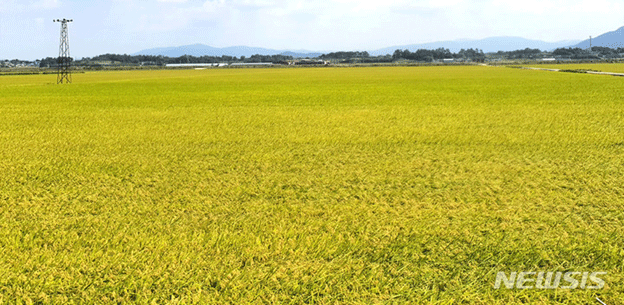In a groundbreaking move to bolster food self-sufficiency and reduce reliance on imported wheat, Cheongju, South Korea, has embarked on cultivating a unique crop known as “flour rice.” This initiative is spearheaded by the city’s first dedicated flour rice production zone, established in the North Buk area of Cheongju.
Flour Rice Production and Goals
Cheongju’s flour rice production zone spans 60 hectares in the Hwaseong-ri and Hwa-hwa-ri regions of the Cheongwon District. The area is currently growing the Baromi2 variety, with the harvest anticipated in mid-October 2024. This initiative, which began with rice planting in June, involves 43 local farmers organized under the Yangji-male Farming Association.
Flour rice, also known as “powdery rice” (분질미), is a novel variety that can be ground into flour without pre-soaking, making it a viable alternative to traditional wheat. Unlike regular rice, which is typically used for meals, flour rice is ideal for processing into bread, baby food, and snacks, meeting a different market need.
Strategic Benefits and Support
The cultivation of flour rice offers several strategic advantages. By maintaining rice paddy fields, it addresses the structural surplus issue of traditional rice while simultaneously reducing dependence on imported wheat. This aligns with broader goals of enhancing national food security and self-sufficiency.
The city has invested approximately 400 million won in 2024 to support the establishment of the production zone. This funding covers seedling production, agricultural machinery, and joint management and cultivation training. The Yangji-male Farming Association plans to expand its cultivation area from 60 hectares to 150 hectares by 2026, aiming to build a stable production system and scale up operations.
Current Status and Future Plans
The initial results from the flour rice production zone have been promising, with reports indicating excellent crop conditions. Cheongju officials are committed to supporting the development of this strategic crop and are optimistic about its future contributions to local agriculture and food security.
Cheongju’s innovative approach to flour rice cultivation represents a significant step toward reducing reliance on imported wheat and addressing local food security challenges. With ongoing support and planned expansion, this initiative could set a precedent for other regions looking to enhance their agricultural resilience and self-sufficiency.
Error




